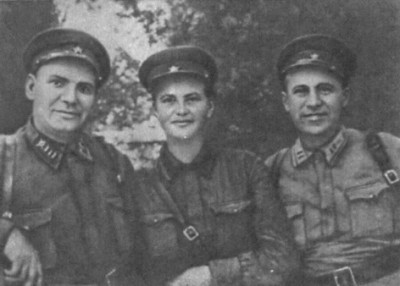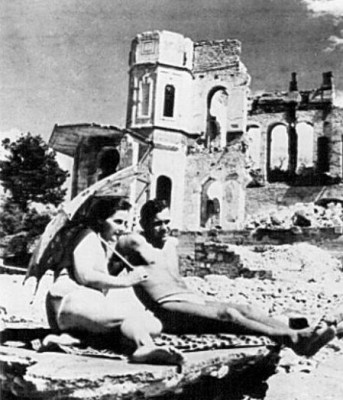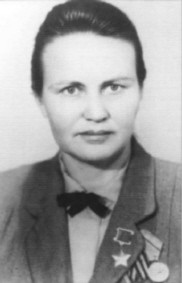Senior Sergeant Mariya Karpovna Bayda-Yeliseyeva - nurse Independent Seaside Army North Caucasus Front
(1922 - 2002)
Heroine of the Soviet Union
She was born on February 1, 1922 in the village of Novoselskoye of the Black Sea region in Crimea to a family of peasants. She graduated from incomplete high school in 1936 and joined the sovkhoz. She then worked at Krasnoperekopsk Hospital, where she completed a course in nursing.
When the war began, she enlisted as a nurse in the Red Army and in September 1941 joined the 2nd Battalion of the 514th Rifle Regiment of the 172nd Rifle Division Independent Seaside Army North Caucasus Front. Under fire, it carried several dozen wounded Red Army men out of the battle. On 10 June 1942, during the defensive fighting at Sevastopol, she and her group were forced to repel an attack by a much larger enemy. Firing from a captured German MP-40 and, after running out of ammunition, a Soviet PPS-41, she cut down fifteen German soldiers, killing one of the attackers who had penetrated their hideout with the butt of his rifle. Although she was wounded by shrapnel in the leg and head, she nursed her fellow soldiers during the fight. She took advantage of her knowledge of the area and led two Soviet officers and several soldiers out of the encirclement after dark.
For her extraordinary heroism, Sergeant M. K. Bajda was awarded the Gold Star of the Hero of the USSR on 20 June 1942.
Mriya learned of the award of the highest state decoration at the field hospital in the Innkermansky Rocks, where she celebrated it with an exquisite Sevastopol champagne. It was the last one for a long time, as with a splint on her leg she could not make the long march to Simferopol, so she took refuge with the other wounded. In the middle of July 1942, she fell into captivity. By then "Masha Sevastopolskaya", as she came to be called, was already famous. However, she managed to conceal her identity and get on a transport of women destined for forced labor in Germany. She passed through labor camps in Poland and ended up in the Austrian Alps, where she joined a resistance organization in a women's camp. It was there that the end of the war found her, when the camp was liberated by the Americans on 8 May 1945.
She returned to the Crimea and was treated for tuberculosis in Sevastopol. There she met her future husband, front-line soldier Stepan Yeliseyev. Like all those who went through captivity and forced deployment in Germany, she underwent interrogations at the KGB. Most recently in 1950. She married, had a son and a daughter. In 1974 she became an honorary citizen of Sevastopol. In the 1990s, after the collapse of the USSR, she was committed to preserving the joint Russian-Ukrainian defense, especially in the division of the Black Sea Fleet.
She died on 30 August 2002 in Sevastopol.
Source:
http://sevastopol.su/person.php?id=166
ru.wikipedia.org
(1922 - 2002)
Heroine of the Soviet Union
She was born on February 1, 1922 in the village of Novoselskoye of the Black Sea region in Crimea to a family of peasants. She graduated from incomplete high school in 1936 and joined the sovkhoz. She then worked at Krasnoperekopsk Hospital, where she completed a course in nursing.
When the war began, she enlisted as a nurse in the Red Army and in September 1941 joined the 2nd Battalion of the 514th Rifle Regiment of the 172nd Rifle Division Independent Seaside Army North Caucasus Front. Under fire, it carried several dozen wounded Red Army men out of the battle. On 10 June 1942, during the defensive fighting at Sevastopol, she and her group were forced to repel an attack by a much larger enemy. Firing from a captured German MP-40 and, after running out of ammunition, a Soviet PPS-41, she cut down fifteen German soldiers, killing one of the attackers who had penetrated their hideout with the butt of his rifle. Although she was wounded by shrapnel in the leg and head, she nursed her fellow soldiers during the fight. She took advantage of her knowledge of the area and led two Soviet officers and several soldiers out of the encirclement after dark.
For her extraordinary heroism, Sergeant M. K. Bajda was awarded the Gold Star of the Hero of the USSR on 20 June 1942.
Mriya learned of the award of the highest state decoration at the field hospital in the Innkermansky Rocks, where she celebrated it with an exquisite Sevastopol champagne. It was the last one for a long time, as with a splint on her leg she could not make the long march to Simferopol, so she took refuge with the other wounded. In the middle of July 1942, she fell into captivity. By then "Masha Sevastopolskaya", as she came to be called, was already famous. However, she managed to conceal her identity and get on a transport of women destined for forced labor in Germany. She passed through labor camps in Poland and ended up in the Austrian Alps, where she joined a resistance organization in a women's camp. It was there that the end of the war found her, when the camp was liberated by the Americans on 8 May 1945.
She returned to the Crimea and was treated for tuberculosis in Sevastopol. There she met her future husband, front-line soldier Stepan Yeliseyev. Like all those who went through captivity and forced deployment in Germany, she underwent interrogations at the KGB. Most recently in 1950. She married, had a son and a daughter. In 1974 she became an honorary citizen of Sevastopol. In the 1990s, after the collapse of the USSR, she was committed to preserving the joint Russian-Ukrainian defense, especially in the division of the Black Sea Fleet.
She died on 30 August 2002 in Sevastopol.
Source:
http://sevastopol.su/person.php?id=166
ru.wikipedia.org


